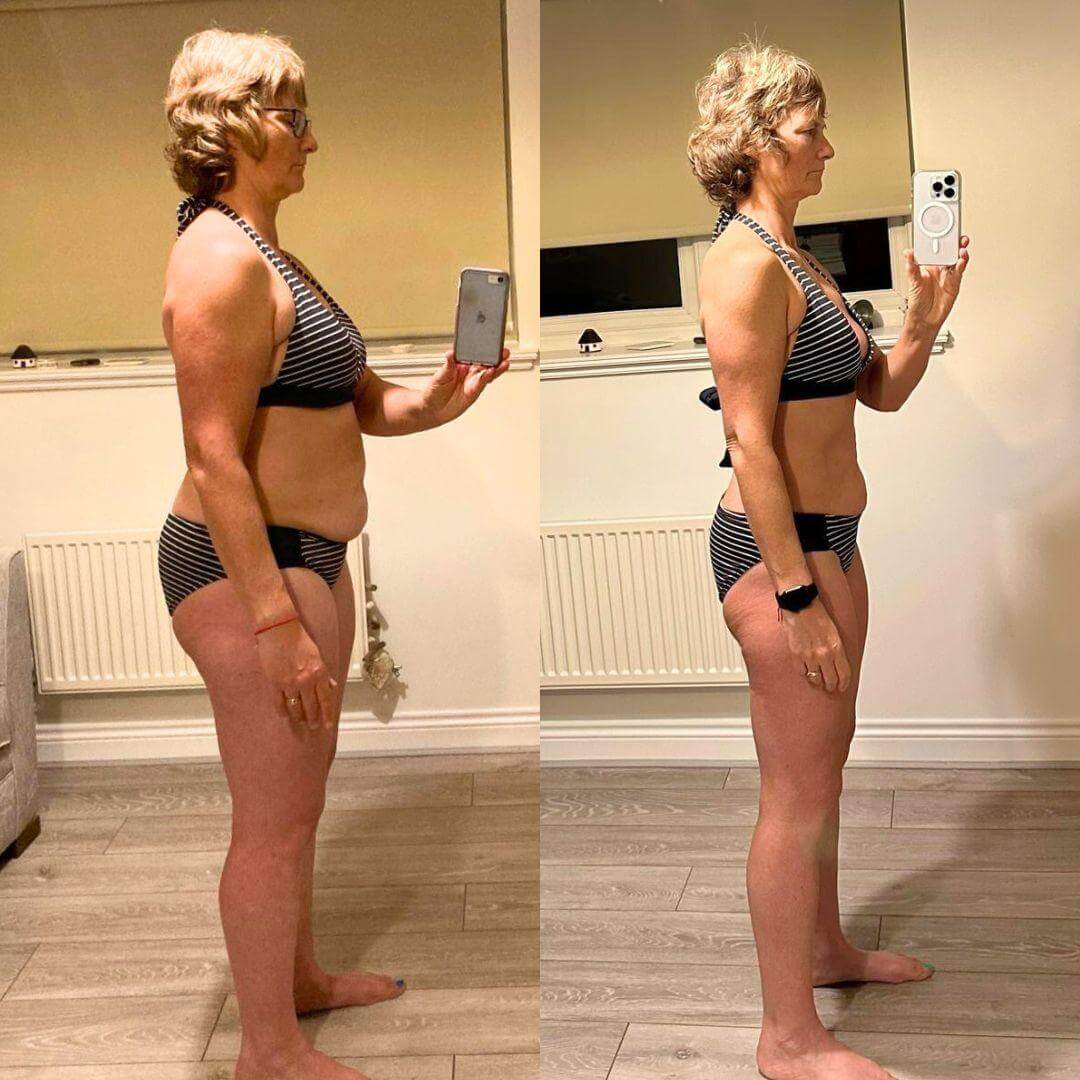If you’ve been wondering why you keep gaining weight, even though you’re eating healthily, exercising, and doing “all the right things”, you’re not alone. Many women in their 40s, 50s and 60s experience unexplained weight gain, especially around the middle.
And what’s worse is that the things that used to work in your 20s and 30s, like cardio workouts and cutting calories, just don’t seem to do anything anymore.
Sound familiar?
In this article we’ll look into the real causes of weight gain in midlife, why your body is changing, and most importantly, what you can do about it.

Why Weight Gain Happens in Menopause
During menopause, your body goes through a lot of hormonal changes, and many of these begin earlier than most people think, often starting in your late 30s or early 40s. The most significant shift is in your sex hormones which are estrogen and progesterone.
As your estrogen levels drop, it can lead to a range of symptoms: hot flushes, joint pain, night sweats, brain fog, and yes, weight gain.
But here’s the key: it’s not just a drop in estrogen that’s the problem. What really makes a difference is how your body starts to respond to stress.
That’s where cortisol, your stress hormone, comes in.
Cortisol isn’t all bad and in short bursts (like during a workout), it helps break down fat and build muscle. But when cortisol is constantly elevated, which can happen from chronic stress, poor sleep, dieting, and intense exercise, it creates what we call the weight gain triangle.
Chronically high cortisol levels can cause:
- Insulin resistance – making your body store more fat, especially around your belly
- Leptin resistance – increasing hunger and cravings for high-calorie foods
- Slower thyroid function – reducing your metabolism and making it harder to lose weight
This is why so many women experience rapid weight gain, even when they’re putting in loads of effort.

“Before I started Trinity I was pretty fed up with the way I felt in relation to my body – my weight had gradually crept up to nearly 80kg. I was thickening around my middle, and buying bigger sizes in clothing 14-16. Even my family had commented on my weight gain! In just over a year with Trinity, weight wise I have lost 13kg and my intuition with food is improved. I sleep so much better, my menopausal symptoms have virtually abated. I embrace meditation and have reduced anxiety levels. My mind-set has totally changed. I feel much happier, and satisfied with life.”
– Helen Huntington (57), Trinity Client
6 Reasons You Are Gaining Weight Over 40
By the time you hit your 40s, life has probably become more demanding than ever. You’re juggling work, family, maybe even caring for ageing parents. And with all that, your body starts changing in ways that aren’t always easy to spot… at first.
Here are some of the most common causes of weight gain in women over 40:
1. Hormonal Changes
As we mentioned, the drop in estrogen combined with increased cortisol can change how your body stores fat. Women are also more sensitive to stress as they age, leading to more fat being stored, especially around the waist.
2. Loss of Muscle Mass
From your mid-30s onwards, your muscle mass starts to decline if you’re not actively strength training. Since muscle burns more calories than fat, less muscle means a slower metabolism — making it easier to gain weight and harder to lose it.
3. Slower Metabolism
Your basal metabolic rate (how many calories your body burns at rest) naturally declines as you age. Combine that with low energy, long working hours, or less physical activity, and weight gain becomes almost inevitable.
4. Dieting and Over-Restriction
Many women resort to very low-calorie diets (think 800-1200 calories per day), skipping meals, or avoiding entire food groups. But this can increase cortisol and push the body into “survival mode,” leading to fluid retention, hormonal imbalance, and more fat storage.
5. Inflammation
Inflammation is your body’s natural response to injury or infection, but when it becomes chronic, it contributes to many health issues, including weight gain.
Chronic inflammation disrupts hormones like insulin and leptin, increases fat cell storage, and reduces your body’s ability to burn calories effectively.
Inflammation can also affect your gut health, leading to bloating, fluid retention, and cravings for sugary or high-calorie foods.
6. Lifestyle Factors
You may be stuck indoors more, skipping workouts, relying on caffeine or alcohol to manage stress, or eating more processed foods and all of these can worsen the effects of menopause on your weight.

“Since joining Trinity I have lost 16kg and 21 inches all over. This equates to dropping from a dress size 22-24 to a size 14. I look younger and I feel so much better. I can walk up stairs, I don’t avoid clothes or shops from sheer humiliation and I have a new zest for life. I feel I’ve been through a huge amount in the last few years and I am being completely honest if I say I am not sure I’d still be here if it wasn’t for this programme. My confidence and health are so much better and now I love weights!”
– Rebecca Vears (51), Trinity Client
8 Ways to Lose Weight and Keep It Off
You can absolutely lose weight in your 40s, 50s and beyond, but it requires a different approach than you used in your younger years. Forget crash diets or bootcamp-style workouts. The key is to work with your body, not against it.
Here’s what we recommend for our coaching clients:
1. Avoid Starvation Diets
Very low-calorie diets may have worked when you were younger, but over 40 they can make things worse. These diets spike your internal stress levels and lead to unintentional weight gain, even if you’re eating “less”.
The body sees starvation as a threat, which triggers the weight gain triangle. Instead, you want to follow the Goldilocks principle: not too much food, not too little, just right.
At Trinity, we use an approach called Hormonally Balanced Eating. This involves eating the right amount of the Key 3 nutrients: Calories, Protein and Fibre.
This method is tailored to each woman’s needs and body type. Most of our clients are surprised by how much they can eat and still lose weight consistently week after week.
1. Exercise in a Low-Impact Way 3–4 Times per Week
Many women fall into the trap of doing high-intensity workouts like HIIT, spinning, or bootcamps, thinking more is better.
But this kind of physical activity only spikes cortisol, increases injury risk, and actually makes fat loss harder, especially around the middle.
Instead of doing HIIT, spinning or intense cardio, we recommend LIST (Low Impact Strength Training) 3 times per week. This builds muscle, boosts metabolism, and avoids triggering the stress response.
It’s gentle on joints and can be done from home. Many of our clients do a 30-minute session in between meetings or after the school run.
2. Aim for 5,000+ Steps Per Day
If you’re sitting at a desk all day, your body isn’t using much energy, which means it’s easier to gain weight unless your calorie intake is extremely low.
But the good news is that increasing your steps is an easy, low-stress way to support fat loss.
Keeping your step count up is a powerful way to stay active without raising cortisol. Try using a standing desk, taking short walks between calls, or even getting a walking treadmill at home.
3. Reduce Your Alcohol Intake
Drinking alcohol changes the way your body works. When alcohol is in your system, your liver stops burning fat and starts processing alcohol instead.
It also reduces testosterone, a hormone that helps keep metabolism high. This effect can last a full day after drinking.
And because your body can’t process other calories while alcohol is present, those calories are more likely to be stored as body fat, especially belly fat, which is already harder to shift during menopause.
While cutting alcohol completely is ideal, most women can still make progress drinking just 1–2 alcoholic drinks per week. There are great low-calorie, alcohol-free alternatives now like:
- Eisberg Sparkling Wine
- Lucky Saint Unfiltered Lager
- Becks Blue
- Seedlip (non-alcoholic gin)
These options help reduce calorie intake and eliminate the post-drink cravings that often lead to mindless eating.
4. Improve Sleep to Keep Cravings at Bay
Sleep is one of the most underrated fat-loss tools, especially during menopause. Poor sleep increases the hunger hormone Ghrelin and reduces Leptin, the hormone that signals fullness.
That’s why after a bad night, you wake up craving sugar and carbs.
When sleep is disrupted, cravings rise, portion control gets harder, and you’re more likely to gain weight, particularly around the middle. Better sleep helps manage your stress hormone cortisol, keeps your energy up, and supports better food choices.
5. Drink Less Caffeine
While caffeine can give you a boost, it also raises cortisol levels and disrupts sleep. And as you now know, both of these make it much harder to lose weight.
Caffeine also lingers in the system, its half-life is 6 hours, meaning it’s still in your body late into the evening.
For women over 40, decaf or no caffeine at all is best, especially if you struggle with sleep or stress. Reducing caffeine helps you feel calmer, sleep deeper, and stay in fat-burning mode for longer.
6. Cut Down Your Sugar Intake
Sugar spikes insulin, which blocks your body’s ability to burn body fat. Plus, it leads to a blood sugar rollercoaster causing energy spikes and crashes, which drives cravings and makes it harder to stay on track.
One of the most effective strategies we’ve found is to cut sugar out entirely for a short period.
Inside our Fit Over 40 Program, we use a process called the Diet Makeover where clients eliminate sugar and hormone-disrupting foods for two weeks.
This resets their cravings and builds new habits that lead to long-term success.
7. Join Others on the Same Mission
Let’s be honest, doing this alone is hard. But when you’re surrounded by other women on the same journey, it feels possible. You’ll feel motivated, understood, and supported by people who get it.
Being part of a community shifts your identity, from “trying another diet” to “becoming a healthy, fit woman.” As JFK once said, “A rising tide lifts all boats.” Being part of a supportive group lifts everyone up, including you.
8. Get a Coach Who Understands Menopause
Life is busy. Stress at work, family chaos at home, and 101 things on your to-do list. It’s easy to slip into old habits. That’s why having a coach makes all the difference.
A good coach helps you stay accountable, plan around your real life, and get results, even during the hardest weeks. It’s not just about losing belly fat; it’s about putting all the right pieces into place consistently.
And that’s what leads to lasting change.

“I hit 11 stone in October 2022 which was the heaviest in my adult life. Until I came across Trinity I had started to believe it was age and menopause related and there was no escaping – especially when I looked around and saw my female peers similarly changing shape round the middle. I figured I would just have to get used to it. I lost 1 stone in the first 12 weeks and I’m now a shocking size 8 in most things and ALL my wardrobe is back online. However, I wasn’t expecting the mental wins to out-do the physical ones but they have. The program has taught me to I can TAKE CARE OF ME and by doing that I can take care of my loved ones.”
– Jo McClements (56), Trinity Client
When to See a Doctor About Weight Gain
Sometimes, weight gain can be linked to an underlying health condition such as thyroid disorders, insulin resistance, or even heart failure. If you are experiencing:
- Very rapid weight gain without lifestyle changes
- Swelling or fluid retention in your legs or stomach
- Persistent fatigue or dizziness
- Sudden mood changes or irregular periods
- A BMI that increases sharply without reason
It’s important to seek proper medical advice.
Birth control pills, certain medications, and some medical conditions can also contribute to unintentional weight changes, so speak to your GP if you have any concerns.
Ready to Stop Gaining and Start Losing?
At Trinity, we’ve helped over 7,000 women across the UK finally lose the unexplained weight, drop 1–2 dress sizes, and feel amazing in their clothes again — all in just 12 weeks. Our clients often tell us they feel like themselves again. More energy, fewer cravings, stronger, leaner and proud of what they’ve achieved.
Our approach is completely different from the fad diets, quick fixes, or weight loss jabs.
We focus on re-educating you, working with your body’s hormones, and creating a plan that’s sustainable for real life. No more guessing. No more spinning your wheels.
With 97% of our clients getting results, you’ll have the expert support, coaching, and community you need to finally get the results you deserve, for good.
If you’re ready to take back control, feel confident in your clothes again, and never have to diet again…
Your transformation starts here.




